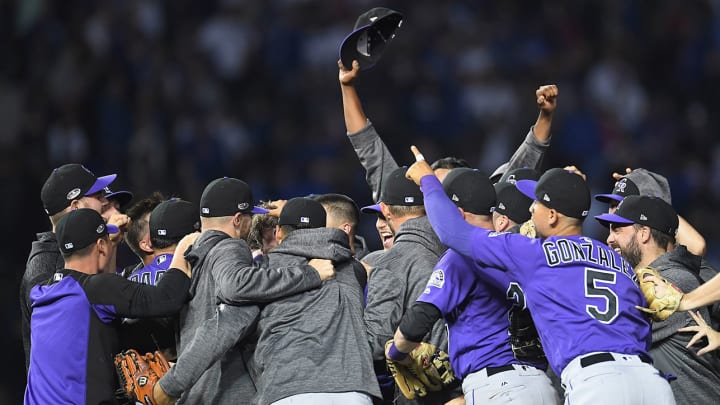Rockies Relish Postseason Breakthrough With NL Wild Card Win at Wrigley

CHICAGO—It had been 22 days since the man at the plate had swiped a hit, about 102 hours since the man on the mound had last pitched. It was the ace against the third-string catcher, an easy equation to solve during the hours when baseball is played—but this was not one of those hours. This was past 11 p.m., the 13th inning of an elimination game at Wrigley Field, and in the upside-down, Tony Wolters ended up on first base.
Wolters, who was batting .170 when he walked to the plate, hit a single off the mound into shallow centerfield. Trevor Story scored, and the Rockies took a 2-1 lead. Just after midnight, in the longest postseason game in baseball’s second-oldest ballpark, that would be enough.
For the first time since 2009, Colorado advances to the NLDS. It caught the Cubs at perhaps the perfect moment: exhausted after fighting for—and then losing—their division, without their starting shortstop, after weeks of up-and-down (but largely down) offense. But those caveats are irrelevant; the Rockies caught them, in the fourth inning of extra baseball, on a diamond chock-full of bench players, when the game comes down to who blinks first.
But what shouldn’t be lost in the Rockies’ performance on Tuesday night, before baseball went wonky, is the game starter Kyle Freeland pitched. With no playoff experience to speak of, Colorado’s ace pitched 6 2/3 shutout innings, striking out six Cubs and walking just one. Sure, Chicago has struggled of late to produce the kind of offense its lineup was once known, but even the Cubs of 2016 might have flailed against Freeland, who was in complete control from the third inning on, manager Bud Black said after the win.
“We, meaning the coaches, the players, have a great deal of confidence in Kyle, just because of how he’s built,” Black added. “He loves to compete. He loves to play. He plays with a tremendous amount of passion and energy. … So I knew going in that he was not going to scare off and back down from his challenge, and pitching on short rest was not going to bother him in this game.”
The 25-year-old Denver native seemed anything but cowed by the moment, joking after the game that “you’ve got to start your postseason experience somewhere.” But there are certainly less-charged environments in which to do so than Wrigley Field in an elimination game, pitching against a starting lineup in which seven of nine players won a title two years ago. The opposing starter, Jon Lester, had 148 postseason innings to his name before Tuesday—and it was all for naught. In the early hours of Wednesday, Wolters wore goggles over his backwards cap. Trevor Story dripped champagne. Lester, the rest of the Cubs and their World Series rings were dry and done.
After the game, a calm Joe Maddon called the game “an instant classic”—and if it wasn’t quite that, it was close. In four hours and 55 minutes, 43 men’s names were scribbled onto scorecards. The Cubs blew through three of their projected four starters for an NLDS they won’t play in. The Rockies double-switched one of their best hitters, Charlie Blackmon, out of the game in the eighth inning, bringing Carlos Gonzalez in to play left in a shuffled outfield. That switch caused a moment—and really, it wasn’t much more than that—in the top of the 10th when Colorado batted two sub-.200 hitters, Pat Valaika and Drew Butera, back-to-back. In the bottom half of that inning, then, pinch-runner extraordinaire Terrance Gore came up to bat for just the 17th time in his career. At least that head-scratcher was the result of some finagling that had directly paid off; Gore, running for Anthony Rizzo, had scored the Cubs’ only run in the eighth inning. Still, as the game wore on and the rosters stretched, it was easier to forget whatever peculiar decisions had come earlier. It was free elimination baseball, with every moment a potential a gut-punch.
The Rockies punched last, and even one final bit of weird—a ball that looked like it hit Gore but actually bonked the umpire—couldn’t breathe life into the Cubs, who ducked out of the playoffs earlier than they yet have in their four-year run of once again being good. And for as much as it seems like the established team got kicked to the curb Wednesday morning, it’s crucial to have a bit of perspective: As recently as 2014, both these teams were losers—but in such different senses.
Even when they lost, the Cubs always had a story: a century-old team, the ivy, the curse. The Rockies, when they lose—which has been plenty often—get no such luxury. They’re baseball’s third-newest franchise, in a city full of transplants, and, well, Coors Field has a great mountain view. But for those who weren’t watching—and plenty weren’t—these Rockies aren’t losers anymore. This season marked the first time in the franchise’s 26-year history that it made the postseason in two consecutive years, inching forward. First, a loss in the wild-card game in 2017. Now, they’re out of it, on the back of a starting rotation that found its stride, even in a ballpark Maddon compared to the moon. Colorado, when it’s struggled, has been a team with tough home-road splits, a team that can hit but whose pitchers get bombed. It’s never quite figured out which direction to go from the mound, but 2018’s roster may have changed that perception. Two homegrown starters, Freeland and German Marquez, finished the year with ERAs under 4.00, and the two racked up strikeouts all season, finishing with 173 and 230, respectively.
In the bullpen, Colorado has been less consistent, but it proved steady in Chicago. Although it allowed a run, the pitcher who did, Adam Ottavino, tossed the two most impressive throws of the night to strike out pinch-hitter Jason Heyward in the seventh inning. The first, a slider, Heyward stared at, to go down 2-2. Next, Ottavino threw the hardest pitch of his year, a 97-mph. fastball, to get him swinging, leaving the bases loaded.
With the Rockies win, the National League cracked a little wider open, as the team that held its best record for almost all of 2018 went home—or in this case, stayed home. Colorado gets a few more days in the Midwest, a date with the team that stole the Cubs’ division from them before the Rockies stole their shot at a real postseason berth. With four NL teams left fighting, it’s a logjam: The 96-win Brewers have the best record of them all. The 91-win Rockies are surging, and the 92-win Dodgers are perhaps more talented than their record but still streaky. Who’s left? The 90-win Braves, who weren’t involved in this Monday-Tuesday madness, are at once an afterthought and the only team in the league able to win its division outright.
The National League hasn’t had a more charged September since 2011, and one game into the postseason, it already feels like it’s provided a week’s worth of thrills, between two Game 163s and all this bonus baseball in Chicago. It feels like anyone’s league, anyone’s title—and no game could have underscored that better than Tuesday night’s. It was anyone’s, everyone’s. Wolters spent most of the 11 innings before he entered the game stretching at intervals, hoping it might be his, hoping for his first hit since September 10. He was due, and so was his team.
